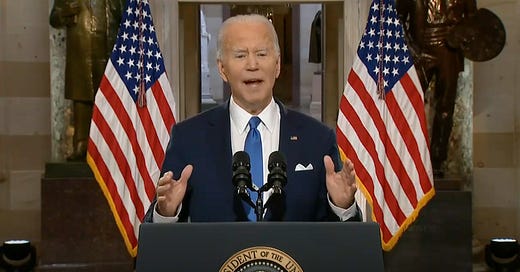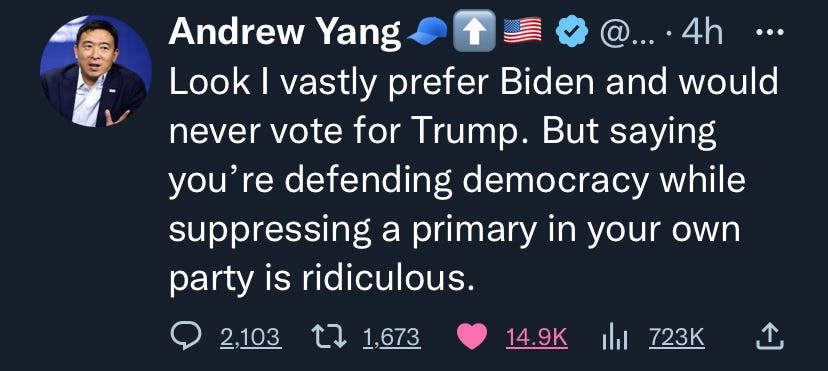Democracy is not on the ballot, despite Biden’s claims
A letter to liberals concerned about Trump
On Friday, President Biden delivered a speech widely hailed as a defense of democracy from an existential threat in the form of his likely general election opponent, Donald Trump.
Many—including me—share the president’s view of his predecessor as a threat to democracy.
But Biden relied on listeners to forget his own record.
“[A] presidential election is underway that each of the major corporate political parties are framing as tests of civilization, while advancing candidates who have shamelessly rejected any pretense of public accountability.”
The worthy concerns of liberals
Many of Biden’s supporters feel concerned that if Trump returns to the presidency, he will unleash a wave of retribution targeting his political opponents, undermine crucial institutions, and impose his own will on the country.
They fear that democracy in America would collapse if Trump wins a second term.
Liberals remember Trump’s mendacity. They remember his unrepentant lies in office. They remember his incitements to racist violence, his insults to military veterans and their families, and his seeming willingness to set a torch to any institution in Washington while relentlessly promoting himself and his family fortune.
Some of those same observers perceive Trump as the worst president in history. If nothing else, he certainly has rivals. Earlier ones deployed weapons of mass destruction against civilian populations, committed overt genocide against Native Americans, and rejected any pretense of equal rights for women, or racial or gender minorities.
Some of Trump’s critics might disregard his policy record as president entirely, and focus only on his seeming disdain for democracy, from defaming poll workers to inviting an insurrection to challenge the congressional certification of the electoral college vote. Few presidents have ever been so openly hostile to constitutional norms. His overt and public strategy to regain office in order to pardon himself from any number of outstanding criminal prosecutions reduces the office of the presidency to a self-serving mockery.
From the standpoint of constitutional law, Trump’s most severe crimes were stealing from the Republic, which he did in any number of ways. Most directly, he effectively directed Secret Service funds into his pocket. His entourage of agents had to join him on his frequent trips to his lavish resorts, and all of their trips were funded by taxpayers.
From an economic standpoint, the inflation of Trump’s personal brand may have ultimately won him far greater returns than payments from federal funds to his businesses. A report released this week suggests that Trump may have been unconstitutionally paid nearly $8 million by foreign governments while serving as president. Given the alleged overestimation of his personal fortune, the fraud pervading his career in business before entering politics, and the $370 million that prosecutors in New York announced yesterday that they will seek in his fraud trial, his personal brand might be among his most valuable remaining assets.
Tragically, neither of the impeachment processes that the House undertook towards Trump when he was in office included any charges related to his corruption, misappropriation of public funds, or constitutionally prohibited emoluments. That’s not a small issue. When I ran for Congress in 2020, one of my defining platform planks was the need to impeach Trump—which, at the time, House Speaker Nancy Pelosi (my opponent in the general election) had refused to do. When she finally caved to public pressure and announced her belated support for impeachment, I repeatedly observed that her impeachment efforts were theatrical because they ignored (and thereby excused and invited the repetition of) his worst offenses.
To be fair, everyone should be concerned about each of these issues. But liberals also run the risk of overlooking the unfortunate reality under all of our feet.
What democracy?
To imagine America to somehow embody democracy in 2023 requires blithely overlooking multiple vectors of authoritarianism that have festered for decades and grown effectively inexorable under each of the major corporate political parties.
I’ll save my substantive critique of Biden Democrats based on their policy preferences for my next post, if only to prevent this one from becoming a book. For now, observations of the political process can suffice.
Democracy in America has suffered no less under the rule of Democrats than it has under Republicans. It has been reduced to a slogan used by presidents to distract a gullible public from the reality before our faces.
In a country that claims to lead the free world, a presidential election is underway that each of the major corporate political parties are framing as tests of civilization, while advancing candidates who have shamelessly rejected any pretense of public accountability. Both have refused to stand for debates. One of them (whom liberals rightly fear) rejected the legitimacy of general elections, but each of them has rejected the legitimacy of primary elections.
In that context, it makes perfect sense to expect former candidates who have expressed interest in the Democratic nomination to be disappointed in the formal rejection of any democratic process to determine the candidate poised to marshal the most support in the general election.
Yang’s concern is not merely that the Democratic Party is denying voters any influence over the choice of the next president. By uniting behind a figure with little public support, Democrats have also done everything possible to maximize the odds of a Trump victory. That would be bad enough, even if they hadn’t recruited him to run for the White House in the first place, thinking that his candidacy would be so extreme to voters that it would make Clinton look good by comparison.
This dynamic of Democrats suppressing democracy emerges beyond national elections for executive offices. Across the country, when congressional candidates have emerged to challenge powerful corporate Democrats in contested elections, we have repeatedly faced racist, Islamophobic, and homophobic smears, despite the reliance of Democrats on constituencies including racial minorities and LGBTQ communities.
This pattern of Democrats smearing their opponents extends beyond merely vicious attacks punching down and left. It has been orchestrated specifically to insulate documented corruption, with the absurd and revealing support of reporters and editors far beyond the corporate press, including supposed “nonprofit” and “independent” alternative voices.
So…what now?
In an earlier era, Dr. Martin Luther King, Jr. invited liberals to reconsider the value of their comforts and weigh them against urgent demands for justice they have ignored in order to indulge their political caution. He wrote prolifically in his Letter from Birmingham Jail about the unfortunate complicity of “the white moderate” in the abuses of his era that they decried, thinking themselves to be allies of those least fortunate, while in fact enabling oppression and injustice by withholding their crucial solidarity and urging patience to their “allies” whose needs they disregard.
Liberals ignored Dr. King’s warnings, only to then co-opt and water down his legacy. Thankfully, however, another voice challenging today’s quintessential white moderate—Joe Biden—offers an opportunity to learn from the mistakes of our forebears, if We the People prove so wise and bold as to make better choices than they did.
For decades, Americans who favor human rights have heard the refrain “bide your time,” or alternatively “not now, when so much is at stake.” Progressives and socialists willing to play along have repeatedly deferred crucial goals—from universal healthcare to climate justice—in order to support the lesser among evils embodied by corporate Democrats.
But the lesser of evils is still evil, and having chosen evil for years has led Democrats, the United States, and frankly our entire species into a tragic corner.
Many liberals imagine Biden to be better than Trump, not recognizing the reality. First, they nominated a candidate in 2020 who had been driven out of previous presidential contests by a long and continuing record of public lies, and who enjoyed little support beyond the party’s elite as a result. Then they chose to insulate him from primary challenges in 2024. Without any irony, they have effectively replicated Trump—yet bizarrely think their version to be a better alternative.
Paid subscribers can access a further section including a preview of my next post, as well as a summary of some other themes that I plan to write about this year.
Keep reading with a 7-day free trial
Subscribe to Chronicles of a Dying Empire to keep reading this post and get 7 days of free access to the full post archives.





